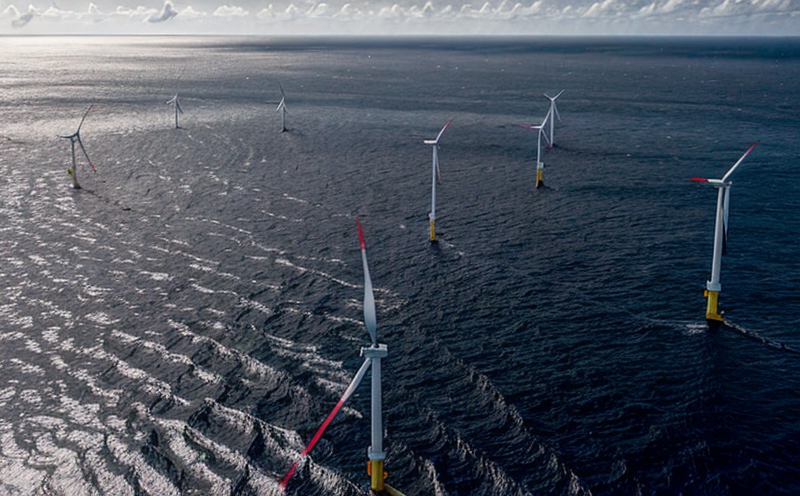ASTM D3080 Shear Strength Testing of Wind Farm Soil
The ASTM D3080 shear strength test is a critical procedure used in the evaluation of soil stability within wind farm installations. This service ensures that the foundation soils can safely support the immense weight and force exerted by wind turbines, which are essential components of modern renewable energy generation systems.
The significance of this test lies in its role as an integral part of ensuring structural integrity and long-term performance of wind farms. By accurately measuring soil shear strength, engineers can optimize turbine placement, enhance foundation design, and mitigate risks associated with soil failure or subsidence. This optimization is particularly important given the diverse geographical landscapes where onshore and offshore wind farms are typically built.
Shear strength testing adheres to international standards such as ASTM D3080-18a, which specifies methods for determining the shear strength of undisturbed or disturbed soil samples using a vane shear apparatus. The process involves collecting soil samples from various depths at different locations within the proposed wind farm site. These samples are then tested in controlled conditions to simulate real-world loading scenarios.
The results of these tests provide critical data that helps predict how well the foundation soils can withstand the lateral forces exerted by wind turbines during operation. This information is invaluable for ensuring compliance with regulatory requirements and safety protocols, thereby safeguarding both operational efficiency and environmental impact.
- Enhanced Safety: By accurately assessing soil shear strength, risks of structural failure are minimized.
- Compliance Assurance: Ensures adherence to local and international standards for wind farm development.
- Optimized Design: Provides precise data for foundation design, leading to more efficient use of resources.
- Environmental Impact Reduction: By minimizing the risk of subsidence or soil failure, operational stability is enhanced, reducing potential environmental disturbances.
The expertise required for ASTM D3080 testing includes a comprehensive understanding of geotechnical engineering principles, advanced instrumentation techniques, and stringent quality control measures. This ensures that every test conducted meets the highest standards of accuracy and reliability.
Our team of experienced engineers uses state-of-the-art equipment to perform these tests meticulously. We follow strict protocols outlined in ASTM D3080-18a to ensure consistent results across all samples tested. The data collected from these tests is analyzed thoroughly, providing detailed reports that offer actionable insights for stakeholders involved in wind farm projects.
In conclusion, ASTM D3080 shear strength testing plays a pivotal role in ensuring the safety and efficiency of wind farms. By leveraging this service, you can trust that your project will be designed with optimal consideration given to soil stability, thus paving the way for successful renewable energy initiatives.
Scope and Methodology
The ASTM D3080 shear strength test involves several key steps to ensure accurate measurement of soil shear strength. The first step is selecting representative soil samples from various depths within the wind farm site. These samples are then prepared according to specified procedures outlined in ASTM D3080-18a.
The vane shear apparatus, which complies with the standard's requirements for precision and accuracy, is used to perform the test. The apparatus consists of a cylindrical vane that penetrates into the soil sample at a controlled rate while measuring resistance to rotation. This measurement provides valuable insights into the soil’s shear strength.
Following the testing process, detailed reports are generated based on the collected data. These reports include comprehensive analyses of the measured values and their implications for wind farm design and construction. The results serve as essential inputs for decision-making processes related to turbine placement, foundation design, and overall project planning.
The methodology employed in ASTM D3080 testing adheres strictly to international standards ensuring consistency and reliability across different sites. By following these protocols meticulously, we guarantee that the tests conducted are accurate representations of actual soil conditions at your wind farm location.
Industry Applications
The application of ASTM D3080 shear strength testing extends beyond just wind farm development; it also plays a vital role in other sectors such as civil engineering, construction, and environmental science. For instance, in the context of onshore and offshore wind farms:
- Onshore Wind Farms: The test ensures that the soil beneath turbines can support their massive weights without compromising stability.
- Offshore Wind Farms: It helps in assessing seabed conditions to determine appropriate anchoring strategies for turbine foundations, ensuring they remain secure against ocean currents and waves.
In each case, the test results contribute significantly to minimizing risks associated with structural failure or subsidence. This not only enhances operational safety but also supports sustainable practices by optimizing resource usage and reducing environmental impacts.
Moreover, ASTM D3080 testing is instrumental in aligning projects with local regulations while promoting best practices for renewable energy generation. By leveraging this service, stakeholders can ensure that their initiatives meet the highest standards of quality and reliability.





